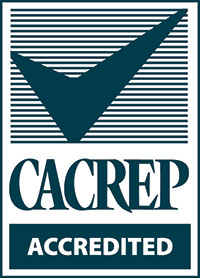The specialization in clinical mental health counseling will prepare counselors to address a wide variety of wellness, prevention and mental health concerns. This concentrated graduate program is tailored for graduates to meet current educational requirements to pursue licensure in the state of Tennessee as a Licensed Professional Counselor (LPC) or as a Licensed Professional Counselor-Mental Health Service Provider (LPC/MHSP). Students outside the state of Tennessee may also be eligible for licensure within their home state after completion of our degree program. Counseling program faculty are available to advise prospective students about that process and to determine licensure eligibility prior to admission into the program.
The Council for Accreditation of Counseling and Related Educational Programs (CACREP) accredits graduate programs in counseling.
The 100% online program has earned accreditation from the Council for Accreditation of Counseling and Related Educational Programs (CACREP) as an advanced degree program within the Department of Educational Studies. Completion of this program of study meets the Tennessee educational requirements as a Licensed Professional Counselor (LPC) and the Licensed Professional Counselor-Mental Health Service Provider (LPC-MHSP).

Fall enrollment : February 20
Spring enrollment: October 8
The Counseling Program Admission Committee adheres to the 2024 CACREP Standards in its admission procedure. Specifically, Section 1.J.:
Entry-level admission decision recommendations are made by the counselor education program and include consideration of each applicant’s
To assist the Committee in making admission decisions, applicants are required to submit an online application:
The following materials will be required in the online application prior to committee review by the Counseling Admissions Board.
After the application deadline, the Admission Review Committee will review each application. The Committee will meet as a group to discuss each applicant.
Individual applicants will be offered an opportunity to participate in an application interview with one or more counseling faculty members. A date and time to meet via Zoom will be determined in discussion with the applicant. The interview will provide an opportunity to learn more about the applicant to determine their interest and aptitude for graduate study in counseling. It gives us a chance to get to know the applicant beyond their written application. We recognize that students will be making a substantial commitment of time, effort and money to pursue this degree. An important consideration is whether our program is a good fit for the applicant, so we are open to questions about our program during this interview. It typically takes up to two weeks past the application deadline for all interviews to be completed.
At the conclusion of the Applicant Interviews the Admission Committee will meet to determine whether each applicant will be offered full admission, denied admission, or offered to be placed on a waiting list for admission. The Committee Review may take an additional two weeks after the application deadline.
Applicants will be notified by email of the committee’s decision. Each new student will be assigned an advisor and encouraged to complete the admission process. Once the student is fully admitted, they will meet with their advisor.
A virtual New Student Orientation will be held for all accepted and enrolled students. This is held prior to the early registration period for each upcoming semester. Meeting this early provides new students the opportunity to learn more details about the program, ask questions, and enroll in their preferred courses.
The purpose of Residency is for the faculty to have an opportunity to fully get to know students and assess their readiness to enter full degree candidacy (if degree seeking) or to be endorsed for school counseling licensure (if an endorsement student). You will participate in large and small group activities, and meet individually with a counselingfaculty member for a short interview/discussion. At the conclusion of Residency the faculty will meet together and discuss each individual student’s strengths and areas for improvement. We will share this with you via email and encourage you to discuss that feedback with your advisor in order to assess your overall progress in the program.
The application for the residency includes the application for candidacy to the counseling program. Being accepted to candidacy means you have been assessed by the faculty in terms of your academic ability, counseling skills, and professional dispositions, and are allowed to continue in the program. This process follows the counseling program's charge as gatekeepers to the profession of counseling, ensuring knowledgable, skilled and ethical individuals graduate from our program to become licensed counselors.
Students will be notified after Residency via email to let them know if they have been fully admitted into candidacy, been approved to continue with endorsement, or if remediation is needed to help them prepare for either of those steps. In that email we will share our impressions of your areas of strength as a student and counselor, as well as areas of improvement.
All counseling students, regardless of whether they are degree seeking or non-degree seeking, must attend Residency. At the conclusion of Residency, non-degree students will be notified of whether they have satisfied Residency requirements in order to be recommended to the state board of education for licensure as a school counselor.
We have created a Google Site to house Residency information and will send you a link once all applications have been received. Information will include the daily schedule, Zoom links for all meetings (if Residency is being held virtually rather than in person), which groups you have been assigned to for small group meetings, and the time and day for your individual meetings with each a faculty member.
The mission of the University of Tennessee at Martin's Master of Science in Education with a major in counseling is to prepare socially ethical and competent professionals in clinical mental health and school settings. We aspire to develop counselors who are technically skilled, personally aware, empathic, and accepting of the cultural and social differences of their clients or students.
The UTM Counselor Education Model is designed to develop counselors who are enhancers of human development and believe counselors should know how to improve learning through the use of a wide variety of materials including human and technological resources. Therefore, embedded within and intertwined among components of the conceptual framework are the commitments to diverse learners and the use of technology as an additional communication tools to enhance student learning.
The Council for the Accreditation of Counseling and Related Programs (CACREP) has identified eight common core curricular areas that are required of all counselor training programs. After completing the graduate degree, our students should be prepared to enter the counseling profession confident in their ability to meet the standards of their chosen professional specialization. The following broad student learning outcomes have been developed to reflect the eight common core areas:
Students will demonstrate sufficient knowledge of content within the eight common core curricular areas (professional orientation and ethical practice, social and cultural diversity, human growth and development, career development, helping relationships, group work, assessment, and research and program development).
Students will demonstrate effective counseling skills in their coursework and during their field experiences.
Students will adhere to the ethical code of their counseling professional association when completing coursework and field experiences.
Students will demonstrate knowledge of their specialty area (clinical mental health counseling or school counseling).
Each academic year the Counseling Program develops an Annual Report that complies with CACREP Standards. The report documents important data for both the Clinical Mental Health and School Counseling specialty areas.
You can find general information regarding licensure requirements in different states on this: How to Become a Counselor - A Guide to Licensure. Students outside of Tennessee are responsible for ensuring the COUN curriculum meets their state's educational requirements for licensure.

